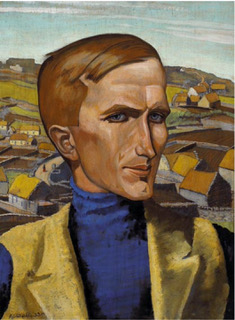Liam O’Flaherty is one of the foremost Irish fiction-writers of the twentieth century. Like none other, he commented in his work on the early years of the Irish state following its incomplete independence from 1921.
Betrayal of the ideals of 1916, betrayal of the ideals of the War of Independence, is the paramount theme in O’Flaherty’s novel The House of Gold (1929). Its significance lies in the way it exemplifies and typifies for Ireland, and by extension for other post-colonial countries, how the newly empowered, corrupt native bourgeoisie has replaced the British ruling class, headed by the money and power-hungry Ramon MorCostello and his clerical abettors.
The House of Gold is O’Flaherty’s only novel in which a gombeenman figures in a leading role; andO’Flaherty states unambiguously in the novel: “in every little town in Ireland you will find a man like Ramon Mor.”
Rather than follow a strictly chronological, traditional plot curve, events take a back seat to the relationships that are revealed in the novel. The social panorama of the town unfolds as all are shown, each in their dependence on the tyrant Ramon Mor.
As in other O’Flaherty novels, there are no heroes, no characters the reader is invited to identify with; instead, in Brechtian style, readers are kept at an emotional distance, which encourages them to view the scenes with a detachment that allows for critical thought and reflection.
The novel’s expressionist style was widespread among modernist left-wing writers at that time. In this respect O’Flaherty proves himself part of the European modernist avant-garde and must be classified along with Brecht and other left-wing modern early twentieth-century writers.
The essential truth about the Irish Free State was, as Liam O’Flaherty saw it, that the new Irish bourgeoisie have simply stepped into the shoes of the English and Anglo-Irish landlords. They have literally moved into their big houses and continue to exploit the working population in the same way as before.
Ramon Mor Costello, and many of the characters around him, are damaged by the times of their own making, deprived of their humanity in diverse ways, out of touch with themselves and their own people. So at this metaphorical level O’Flaherty shows that independence has not brought about a freer society. Ramon Mor’s political power serves only to increase his power over his people, to make them miserable. Their lives are unchanged.
In addition to this, readers see the influence of the Catholic Church, never far away from or independent of Ramon Mor. The doctor comments: “The Church is more sacred than the law, and the citizen has very few rights where the clergy are concerned.”
Many of the impoverished ordinary folk, the people living in the mountains, emigrate. They are Francis O’Neill’s people, among them a big man who damns the new state and Ramon Mor.
In another encounter, this time between Ramon and his own villagers, the parallel character to the big man in the previous scene is Tommy Derrane, who challenges Ramon directly.
These ordinary people see through Ramon Mor, understand his nature, and know they can neither trust him nor expect to be treated any better than they were under colonial rule. They have energy, and insight, and are unafraid, yet isolated, and the majority of the people around them are subservient to Ramon.
The town is destitute, the inhabitants overcome with a sense of powerlessness and hopelessness. The middle-class characters in the novel are ineffectual, often too afraid of Ramon and his power to act decisively. This fear has an impact on a latent resentment that fails to spark into rebellion.
Great is the combined power of church and state. When the doctor suggests setting up a library, the townsfolk comment: “How are ye going to have a library, when Fr. Considine’d come and burn the books? Not that I want a library. That man Ramon Mor has this town sucked dry. Along with taking the people’s money, he has taken their hearts as well.”
The hearts that struggled for independence have been taken away by this unholy alliance. The ideals of 1916, the ideals of 1921, have been sold out. Instead the Free State has become a neo-colonial backwater ruled by the gombeenmen, and created a system where even access to literature and thought is censored.
Typical for O’Flaherty novels of his time, there is no hero, no one person who truly grasps the situation and attempts to change it. The central character is a villain. The majority of the people we encounter appear traumatised by the loss of the ideals for a society that would treat “all the children of the nation equally,” as the 1916 Proclamation had determined.
Demonstrating the absence of a united force capable of bringing about change also defines the realism of O’Flaherty’s work. A sense of petrification prevails.






